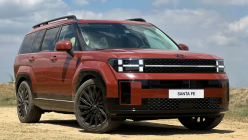Hyundai Motor Philippines (HMPH) has officially launched the all-new 2024 Santa Fe for the local market. It comes in to replace the previous version which was released back in 2022 along with the brand’s relaunch for the Philippines.
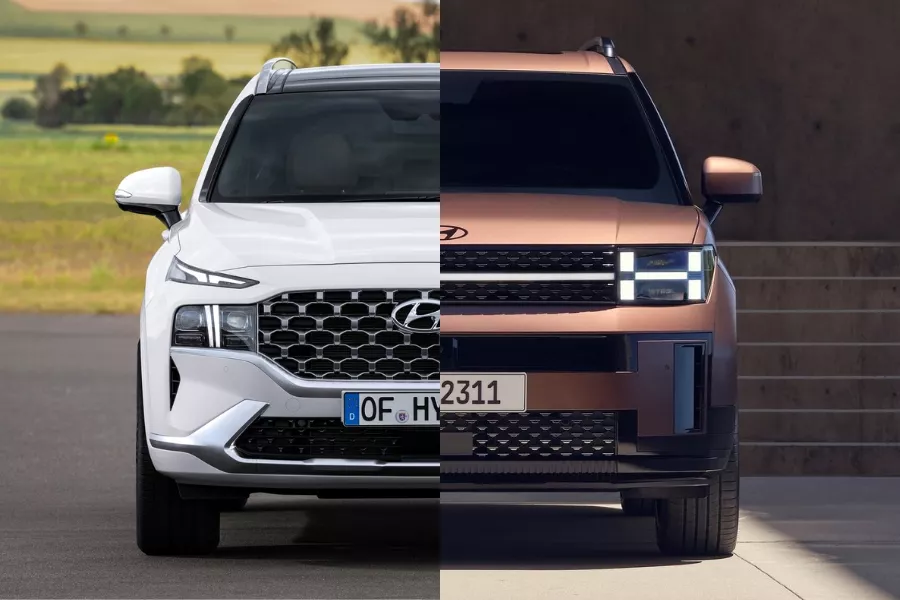
Let's compare the old (left) and the new (right) Hyundai Santa Fe
But how does the new 2024 Hyundai Santa Fe compare against the old Santa Fe? Let’s go over their differences to find out.
2024 Hyundai Santa Fe old vs new: Exterior
To begin this comparison, let’s talk about their dimensions. For the new model, its top-spec version, the Calligraphy, is 4,830mm long, 1,900mm wide, and 1,780mm in height. Its GLS trim is a bit shorter in height at 1,770mm, and it has a wheelbase length of 2,815mm and a ground clearance of 177mm.
Compare that to the older model which had a length of 4,785mm, a width of 1,900mm, and a height of 1,710mm. The previous-gen Santa Fe then had a wheelbase length of 2,765mm and a ground clearance of 176mm.
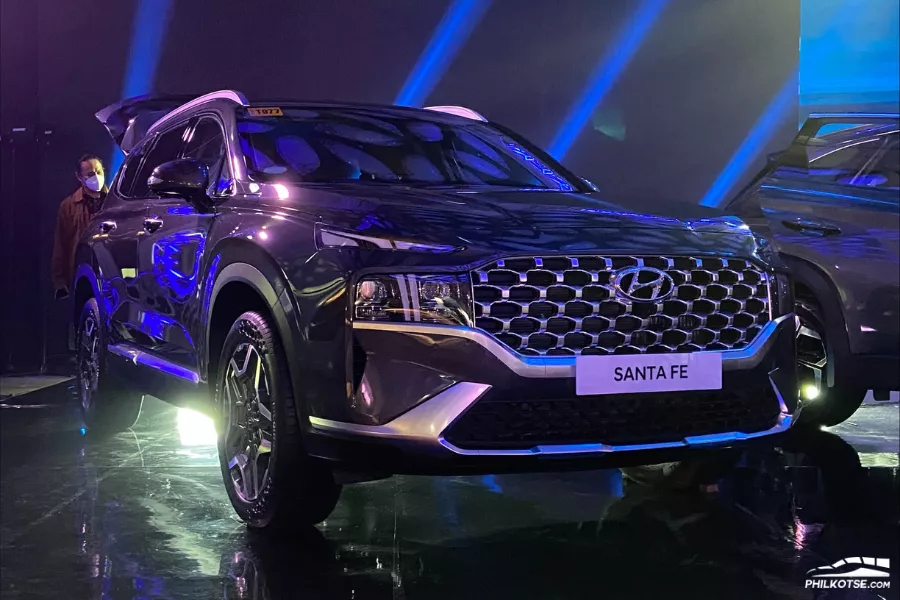
The old Hyundai Santa Fe
According to the figures listed above, the newer Santa Fe is longer and taller compared to the old model. It also has a much longer wheelbase. Their widths are identical, but the length of the newer version might hint at more legroom.
Appearance-wise, this is where the next-gen version clearly departs from the nameplate’s old styling.
The old one featured a more traditional-looking front end with a grille, sharp headlamps, a clear crossover-like silhouette, and a conservative-looking rear with a huge diffuser. The new one meanwhile, goes for a retro-futuristic look thanks to a boxy new body with distinct-looking H-pattern lighting elements, a slimmer grille, a more angular side section, as well as a more eccentric-looking rear end.
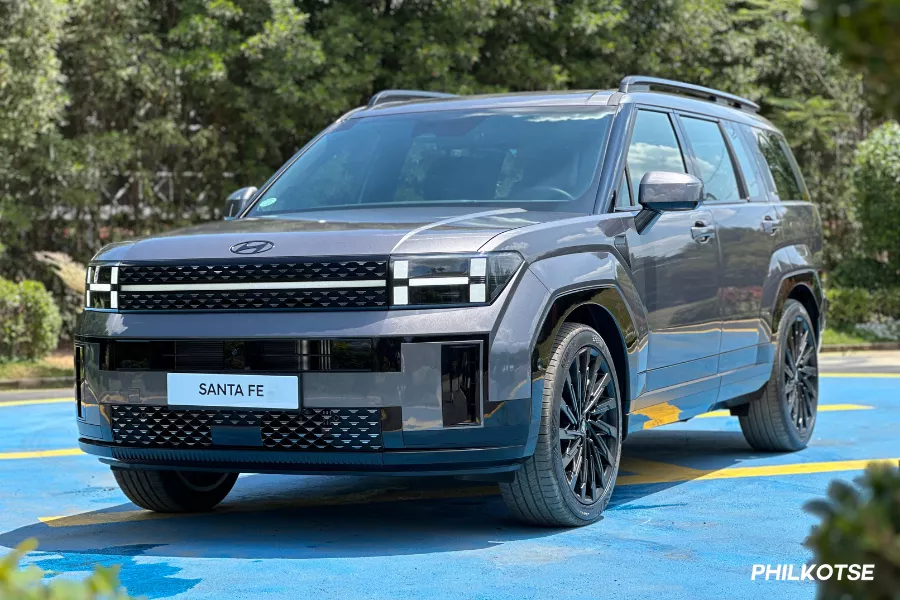
The all-new 2024 Hyundai Santa Fe
We describe the new model’s rear as eccentric as it does depart quite much from the old Santa Fe and crossover SUV tailgate design in general. This is clear to see from how low the tailgate its taillights are. Plus, it gets a rather thin rear bumper which is uncharacteristic of the busy or chunky look common amongst contemporary crossovers and SUVs.
For wheels, the new Santa Fe gets a 20 or 21-inch set which are far larger and more impactful compared to the older model’s 19-inch set. Then again, both models come with plenty of exterior amenities such as power-folding side mirrors, roof rails, rain-sensing wipers, and a power tailgate.
2024 Hyundai Santa Fe old vs new: Interior
Like its predecessor, the new Santa Fe is still a seven-seater. Both also have automatic air-conditioning, and split-folding rear seats.
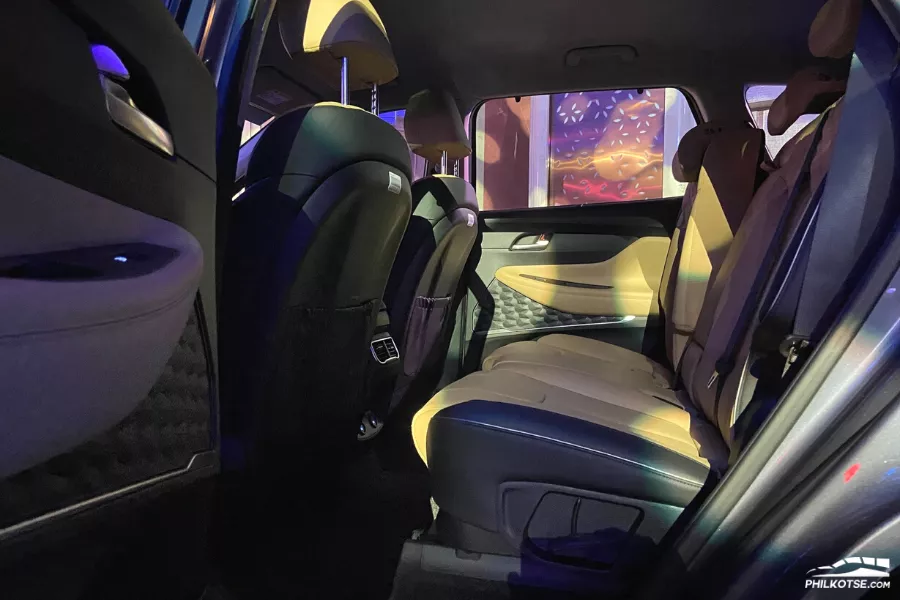
The old model's second-row seats
The new one does have a more modern-looking dash with larger screens, as well as a more streamlined air-conditioning control strip. The new model’s steering wheel likewise carries a newer contemporary style as compared to the old model’s traditional three-spoke design.
Both still have chunky center consoles, but the one on the newer crossover is flatter and has a larger storage box. The 2024 Santa Fe also gets a more ergonomic center elbow rest as well.
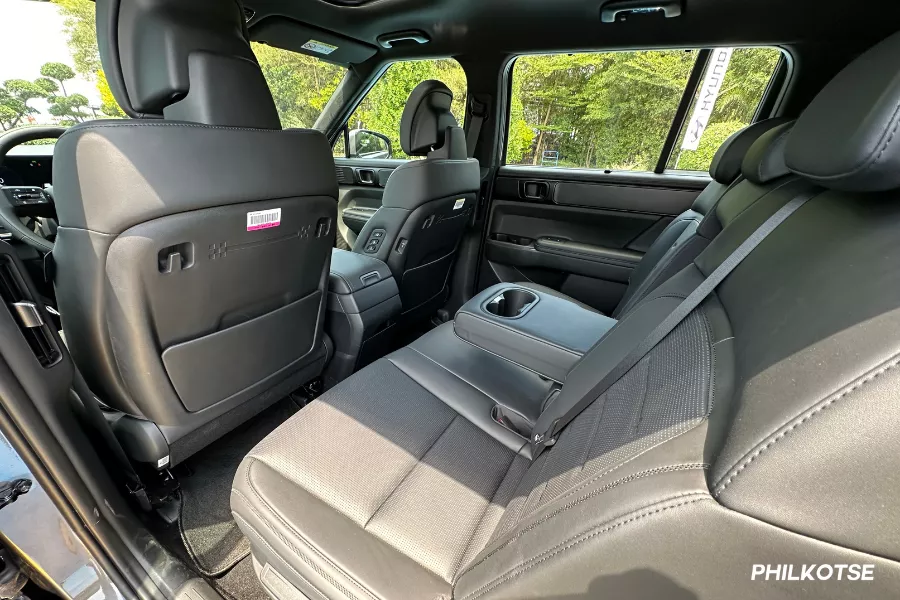
New model's second-row seats
For the driver, gear shifting on the new Santa Fe is now done via a steering column stalk instead of the old model’s gear-select buttons. Both the old and new models get power-adjustable front seats, tilt and telescopic steering columns, and a push-to-start button, among other features.
2024 Hyundai Santa Fe old vs new: Tech & Safety
When it comes to digital displays, the old Santa Fe is equipped with an eight-inch touchscreen display and a digital instrument cluster. The said cluster is separate from the central screen and is nudged deep into the dashboard behind the steering wheel.
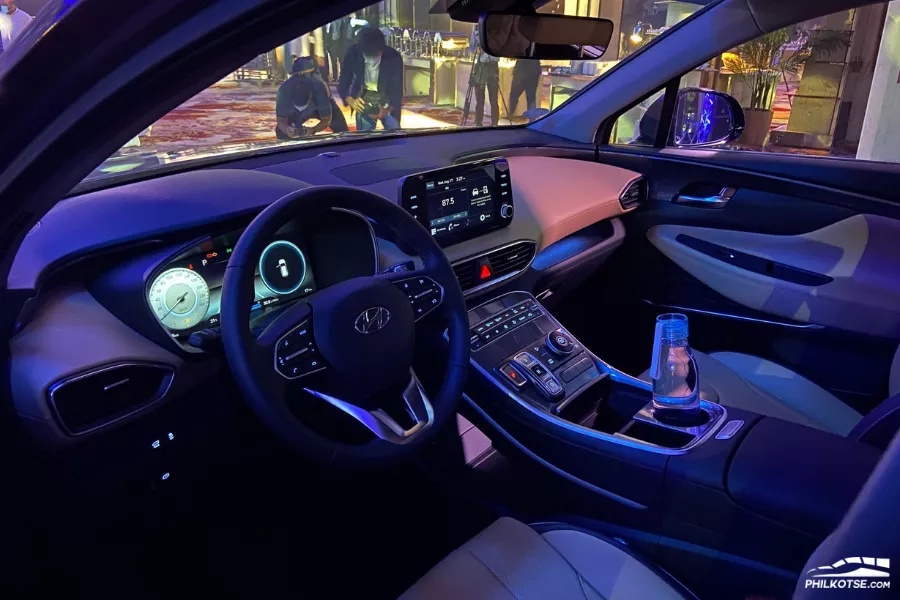
Inside the old Santa Fe
In comparison, the new Santa Fe comes standard with a larger 12.3-inch central touchscreen and a 12.3-inch TFT LCD instrument display. Instead of being separate, these are seamlessly linked together to form a widescreen which in turn, offers a more cockpit-like feel for the next-gen model.
Both the new and old central touchscreen displays get Apple CarPlay, Android Auto, and Bluetooth connectivity. Both are likewise linked to a six-piece speaker system, and both also can take voice commands.
Keeping one’s devices charged up on both the old and new Santa Fe is done easily thanks to a wireless charging pad. On the top-spec next-gen Santa Fe Calligraphy, however, it gets two wireless charging pads.
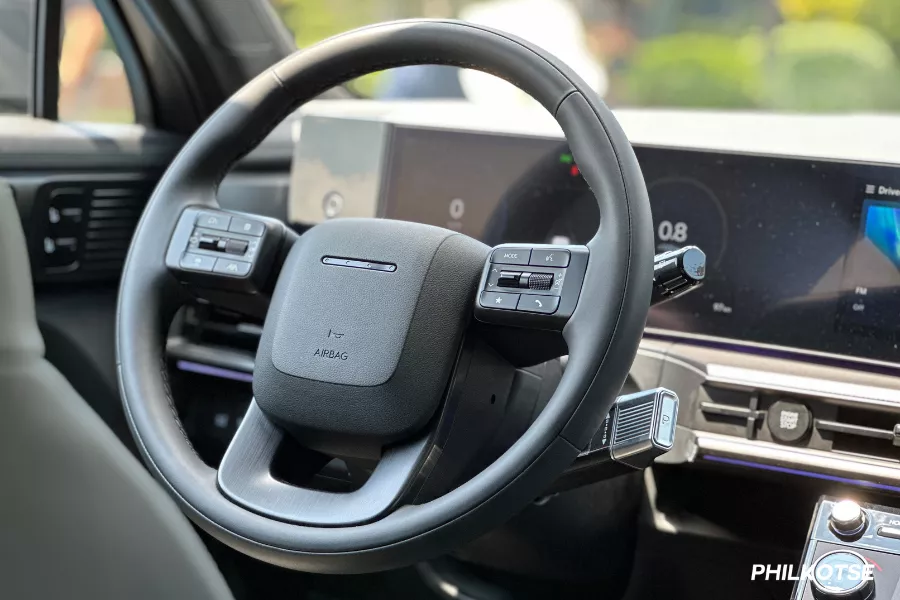
The next-gen model gets a sleeker steering wheel and bigger screens
For safety, the new and old Santa Fe both get anti-lock braking, front airbags, side airbags, curtain airbags, stability control, ISOFIX child seat anchors, hill-start assist, and a 360-degree view camera. The new model does add a tire-pressure monitor, and a trailer stability assist feature on top of those standard safety bits.
The old and new models also get blind-spot monitoring, blind-spot collision warning, and parking distance warning. But the new model further reinforces its suite of advanced driver assist technologies with the addition of adaptive cruise control, lane keep assist, lane follow assist, forward collision avoidance, rear occupant alert, manual speed limit assist, and reverse parking collision avoidance.
2024 Hyundai Santa Fe old vs new: Engine
For what’s under the hood, the old Santa Fe’s sole engine option was a diesel version of the Hyundai Smartstream engine. Specifically, it used a 2.2-liter CRDi that can output 200 horsepower and 440 Nm of torque. Power is sent to its front wheels via an eight-speed dual-clutch transmission (DCT).
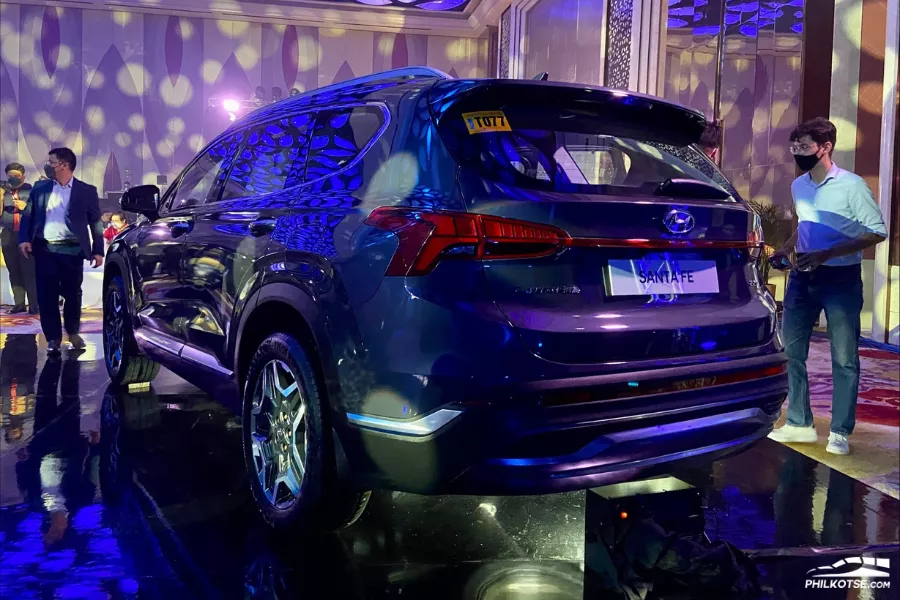
Old Santa Fe from the rear
The new one still uses a Smartstream mill, but it has ditched the old diesel engine for a new 2.5-liter gasoline engine. In its turbocharged form (Calligraphy), it can output 277 horsepower and 422 Nm of torque. The non-turbo version meanwhile (GLS trims) can make 191 hp and 246 Nm of torque.
For the top-spec Santa Fe Calligraphy, the eight-speed DCT makes a return, but it is now paired with an all-wheel-drive (Calligraphy). A front-wheel-drive and an AWD variant are available for the GLS trims, but the latter uses an eight-speed automatic gearbox which was not offered on the older Philippine-spec Santa Fe.
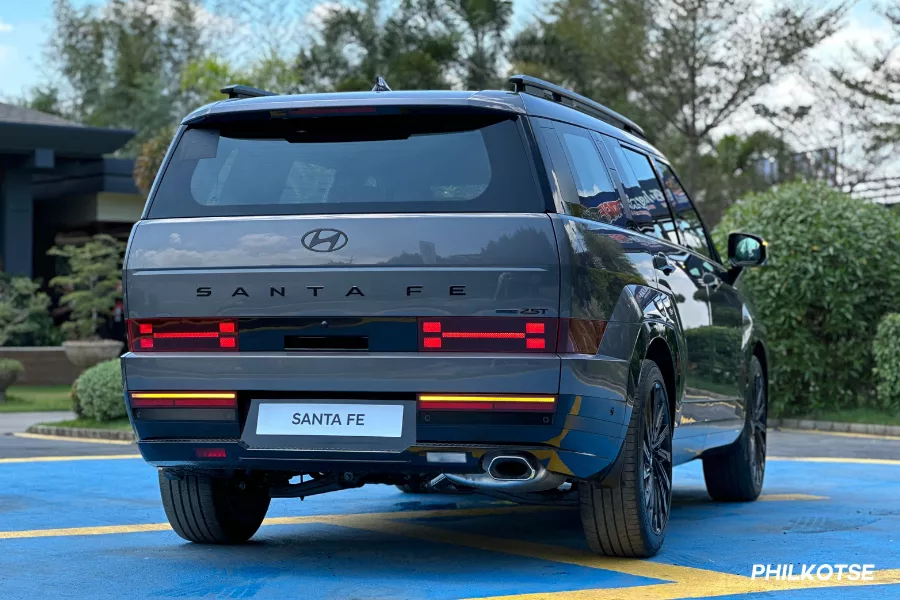
New Santa Fe from the rear
To conclude, the new Santa Fe gets a more distinct style, and heaps of more tech. It also has a more modern interior that offers an increased amount of amenities. The Calligraphy trim also gets one-up against the old Santa Fe by having a more powerful turbo, but even the new GLS variants offer more comfort for what you’re paying for compared to the outgoing model.
Suffice it to say, the next-gen Santa Fe has grown up and is now a vastly different beast compared to its more conservative predecessor.
For more car news, keep it here on Philkotse.
Know more about Hyundai Santa Fe 2026

The 2025 Hyundai Santa Fe is a five-door seven-seater mid-size crossover SUV. In the Philippine market, its four available variants.
Propelling the Santa Fe are two powertrains. For the Calligraphy, it gets a 2.5-liter turbocharged Smartstream gasoline engine that can output 277 horsepower and 422 Nm of torque. The GLS trims meanwhile, get a naturally-aspirated 2.5-liter Smartstream gasoline mill that puts out 191 hp and 246 Nm of torque.
Both GLS trims use an eight-speed automatic transmission, while the top-spec Calligraphy variant uses an eight-speed dual-clutch transmission. The GLS is available in both front-wheel-drive and all-wheel-drive (AWD), while the Calligraphy is exclusively AWD.
Size-wise, the GLS trims are 4,830mm long, 1,900mm wide, and 1,770mm in height. The Calligraphy has the same length and width, but it is slightly taller at 1,780mm.
Locally, the Hyundai Santa Fe competes against the Jeep Grand Cherokee, Subaru Evoltis, GAC GS8, and Ford Explorer, among others.
2025 HYUNDAI SANTA FE: First Impression + Major Changes | Philkotse Quick Look
>>> New and used Hyundai Santa Fe 2025 for sale in the Philippines
Hyundai Santa Fe Launch
The Hyundai Santa Fe was officially launched for the Philippine market in March 2025. It enters the market with four variants.
Hyundai Motor Philippines is introducing a new entry-level variant of the 2025 Santa Fe, likely named the Santa Fe GL, at Festival Mall from July 18 to 20, 2025. Priced at just PHP 1,998,000, this front-wheel-drive model comes with a 2.5L gasoline engine delivering 194 PS and 246 Nm of torque, mated to an 8-speed automatic transmission. Key features include 20-inch wheels, H-shaped LED lights, a smart power tailgate, a 12.3-inch curved infotainment display, wireless charging, and a bi-directional console box—making it a competitively priced option in the midsize SUV market.
Hyundai Santa Fe Exterior
On the outside, this mid-size crossover assumes a modern but boxy shape that’s filled to the brim with amenities. Standard features found outside the Santa Fe include automatic LED headlamps, LED position lamps, LED rear fog lamps, power-folding side mirrors, a power tilting sunroof, rain-sensing wipers, and a power tailgate, among others.
This Hyundai crossover is also equipped with roof rails and a roof-mounted spoiler. Depending on the trim, it rides on a set of 21-inch or 20-inch alloy wheels.
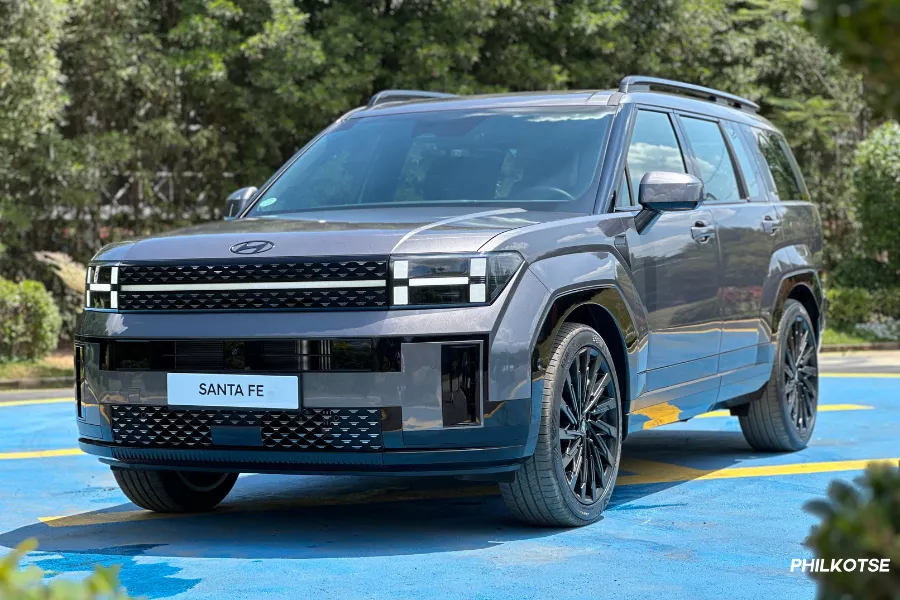
Hyundai Santa Fe Interior
Inside, the Santa Fe offers ample seating for up to seven. All inside the vehicle are kept cool by a dual-zone automatic temperature control system. Passengers also get access to a front and rear 12-volt power outlet, four rear USB ports, 12 cupholders, four bottle holders, and two front USB ports.
For seating, the Santa Fe’s front cabin gets a pair of power-adjustable relaxation seats with heating and ventilation. The second row meanwhile are 60:40 split-folding reclining and sliding seats, while the third row comes with 50:50 split-folding functionality. Depending on the trim, these are clad in Nappa Leather or regular leather.
The driver meanwhile, is provided with a push-to-start button, a center armrest, a fingerprint recognition system, a 12.3-inch TFT LCD instrument cluster, an electrochromic rearview mirror, an LED overhead console lamp, a heads-up display (Calligraphy), a drive mode selector, among others.
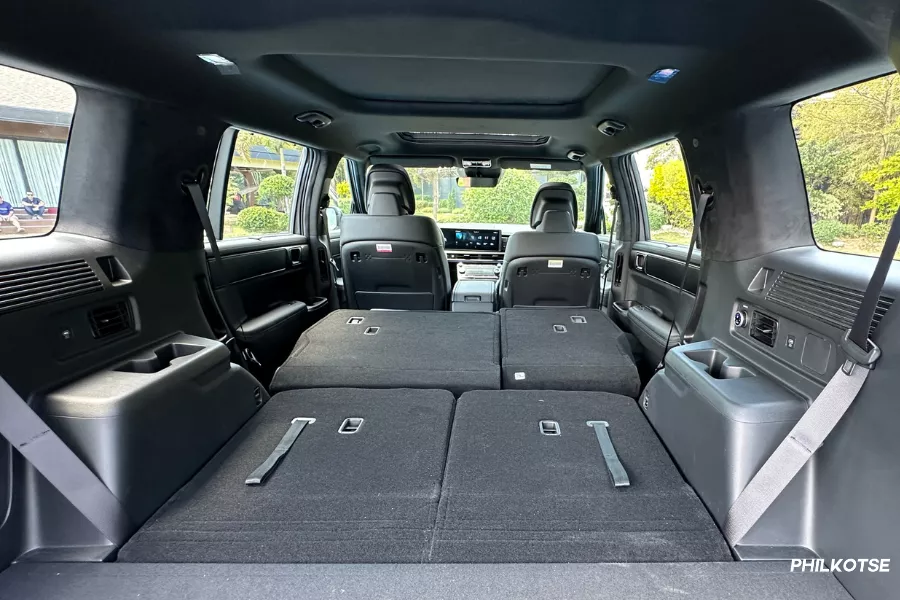
Technology & Safety Features
Standard safety features aboard the Santa Fe include a total of six airbags, anti-lock braking, electronic stability control, trailer stability assist, hill-start assist, downhill brake control, child seat anchors, an engine immobilizer, and a tire pressure monitoring system.
Those standard features are reinforced by a number of advanced driver-assist technologies (ADAS). Notable among these is adaptive cruise control with stop-and-go functionality, automatic emergency braking, lane keep assist, blind-spot monitoring, reverse parking collision avoidance assist, a 360-degree view camera, and plenty of others.
On-board entertainment for the Santa Fe is provided by a 12.3-inch touchscreen that comes with Apple CarPlay and Android Auto connectivity. For all trim, the said screen is linked to a six-piece speaker system. On the Calligraphy, it gets two wireless smartphone charging pads. The GLS trim meanwhile, gets one wireless pad.
Platform & Chassis
Handling ride comfort for the Santa Fe is a McPherson strut front suspension and a multi-link rear suspension. In both the GLS and the Calligraphy trims, these are backed-up by self-leveling high-performance shock absorbers.
Braking power is provided by discs for all four wheels. An electronic parking brake with auto-hold functionality is standard for all four variants.
Engine & Drivetrain
Under the hood of the Santa Fe Calligraphy is a 2.5-liter turbocharged gasoline engine that can output 277 horsepower and 422 Nm of torque. The GLS variants meanwhile, get a naturally-aspirated 2.5-liter engine that can produce up to 191 hp and 246 Nm of torque.
The GLS trims come standard with an eight-speed automatic gearbox, while the Calligraphy uses an eight-speed dual-clutch transmission. Both FWD and AWD are available for the GLS trims, but the Calligraphy exclusively comes as an AWD model.
Hyundai Santa Fe 2025 Price List
Let's check out the Hyundai Santa Fe 2025 price in the Philippines.
| Variants | Price |
|---|---|
| Hyundai Santa Fe 2.5 GLS 8AT 2WD | ₱2,410,000 |
| Hyundai Santa Fe 2.5 GLS 8AT AWD | ₱2,540,000 |
| Hyundai Santa Fe 2.5T Calligraphy 8DCT AWD | ₱3,100,000 |
| Hyundai Santa Fe 1.6 Hybrid AT | ₱3,330,000 |
| Hyundai Santa Fe GLSanta Fe GL | ₱1,998,000 |
Hyundai Santa Fe FAQs
1. How many variants will the Hyundai Santa Fe 2025 have?
The Hyundai Santa Fe will be available in only one variant GLS, according to Hyundai Motor Philippines (HMPH).
2. How much will the Hyundai Santa Fe 2025 cost?
The Hyundai Santa Fe 2025 will be priced from P1,998,000 to P3,330,000.
3. How big is the Hyundai Santa Fe 2025?
The length, width, and height are respectively 4,785 mm; 1,900 mm; 1,685 mm.
4. How many colors will the Hyundai Santa Fe 2025 have?
The Hyundai Santa Fe 2025 will come in 4 colors: Black, White, Taiga Brown, and Lagoon Blue.
5. How can the back-row seats be adjusted?
The second back-row can be adjusted ratio of 60:40, and the ratio of the third back-row can be 50:50 split.
₱ 2,410,000 - ₱ 3,100,000
ExploreRecent posts
- 2023 Hyundai Santa Fe official launch PH Sep 19, 2022
- 2021 Hyundai Santa Fe design revealed Jun 07, 2021
- 2021 hyundai santa official images details Mar 18, 2021






